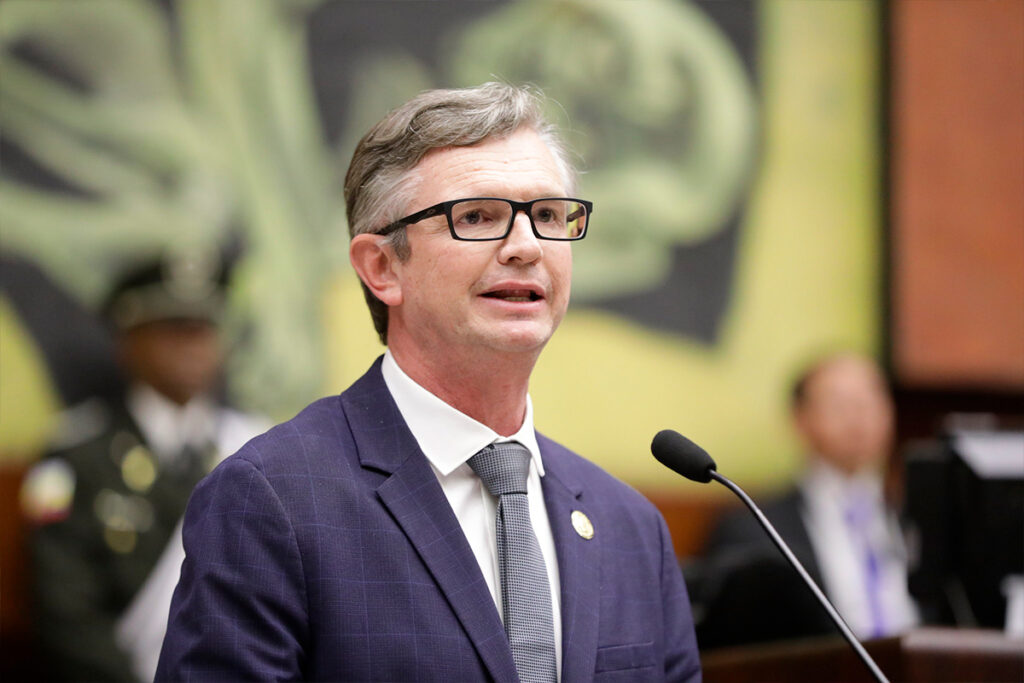Correísta-led Commission deems International Monetary Fund (IMF) loan illegal and calls for Finance Minister’s removal.
The Transparency Commission of the National Assembly, driven by a Correísta (RC) effort against the Noboa government, has issued a significant recommendation regarding Ecuador’s most recent IMF loan. The Commission suggests that the Assembly declare the debt contracted with the International Monetary Fund (IMF) illegitimate, initiate impeachment proceedings against Finance Minister Juan Carlos Vega, and pursue legal avenues to challenge the constitutionality of the agreement.
This recommendation, which represents a concerted political move by the Correísta faction, will be submitted to the National Assembly for consideration and resolution.
Details of the IMF Agreement
In April 2024, the IMF Executive Board approved a 48-month Extended Fund Facility (EFF) arrangement for Ecuador, providing access to $4 billion. This agreement includes an immediate disbursement of $1 billion, intended to support Ecuador’s public budget. Minister of Economy and Finance, Juan Carlos Vega, has presented the agreement as essential for addressing several key issues, including achieving fiscal sustainability, reducing delays with creditors, reactivating the economy, expanding social protection networks, bolstering dollarization, and enhancing the financial sector’s resilience. Additionally, Vega has highlighted the agreement’s potential to strengthen transparency and governance within the country.
Audit Findings and Commission’s Conclusions
The Transparency Commission, led by legislator Patricio Chávez (RC), conducted a thorough audit of the agreement and its oversight process. The Commission’s findings suggest that the IMF loan is primarily intended to service existing debt rather than fund new social programs or investments in economic, social, and cultural rights. According to the audit, approximately 29.7% of the loan amount, equivalent to $2.761 billion, will be allocated to repaying previous IMF credits. The remaining funds are earmarked for settling debts with other state creditors.
The Commission asserts that the agreement fails to address Ecuador’s social spending deficits and is primarily aimed at preventing default and facilitating access to new investment markets. This use of the funds, the Commission argues, violates Articles 418 and 419 of the Constitution, which require the President to promptly inform the National Assembly of all treaties, including their nature and content. As an international treaty, the IMF agreement should have received legislative approval before being finalized.
Constitutional Violations
The Commission also highlights breaches of Article 290 of the Constitution, which sets conditions for public debt. This article stipulates that public debt must not undermine sovereignty, rights, good living conditions, or environmental preservation. It also mandates that debt should be used exclusively for investment programs and infrastructure projects. The Commission contends that the IMF agreement does not meet these constitutional requirements, as it does not address the intended use of funds for infrastructure or other constitutionally mandated purposes.
Furthermore, the report criticizes the lack of a comprehensive economic study that evaluates the impacts of eliminating gasoline subsidies on citizens. The Commission notes that the compensation mechanisms for transporters and the broader effects of these policies are not adequately explained. There is also no clear evidence provided by the Ecuadorian government that the savings from subsidy cuts will be directed towards enhancing social investment.
Recommendations for Action
In light of these findings, the Commission has put forth several critical recommendations:
The Commission recommends that the National Assembly declare the SAF credit agreement with the IMF, signed on April 25, 2024, as invalid and ineffective. The basis for this recommendation is the agreement’s violation of Articles 418, 419, and 18(2) of the Constitution. According to the Commission, these constitutional provisions require that any treaty with such significant implications should be subject to legislative approval and should adhere to constitutional standards.
The Commission further urges the National Assembly to recognize that the debt incurred under the IMF agreement contravenes Article 290 of the Constitution, which outlines the conditions for public debt. As such, the agreement’s validity is called into question.
Additionally, the Commission advises the Assembly to declare the debt illegitimate and instruct the government to refrain from making any further payments or requesting additional disbursements under the agreement. This step aims to prevent any further financial obligations that may arise from the agreement.
The Commission also calls for the initiation of impeachment proceedings against Finance Minister Juan Carlos Vega. The recommendation is based on Vega’s alleged failure to meet constitutional obligations related to treaty agreements, as specified in Article 131 of the Constitution. The Commission argues that Vega’s actions have not aligned with the constitutional requirements for treaty approval and management.
In addition to these measures, the Commission recommends that the National Assembly formally acknowledge that the agreement infringes on economic, social, and cultural rights. Specifically, the agreement is said to violate rights to health, work, culture, social security, progressivity, and non-regression. The Commission urges the Assembly to address these violations to protect and promote these fundamental rights.
The report also suggests that the National Assembly activate constitutional mechanisms to challenge the agreement’s constitutionality in both form and substance. This recommendation aims to ensure that any agreement that conflicts with constitutional principles is reviewed and contested through appropriate legal channels.
Finally, the Commission advocates for the National Assembly to request that the IMF eliminate or forgive the surcharges imposed on Ecuador. Given that Ecuador is one of the most indebted countries to the IMF, this step is proposed to alleviate some of the financial pressures on the country and reduce its overall debt burden.



“…public debt must not undermine sovereignty, rights, good living conditions, or environmental preservation.”
So never have any public debt, because nothing could meet all of these vague restrictions.